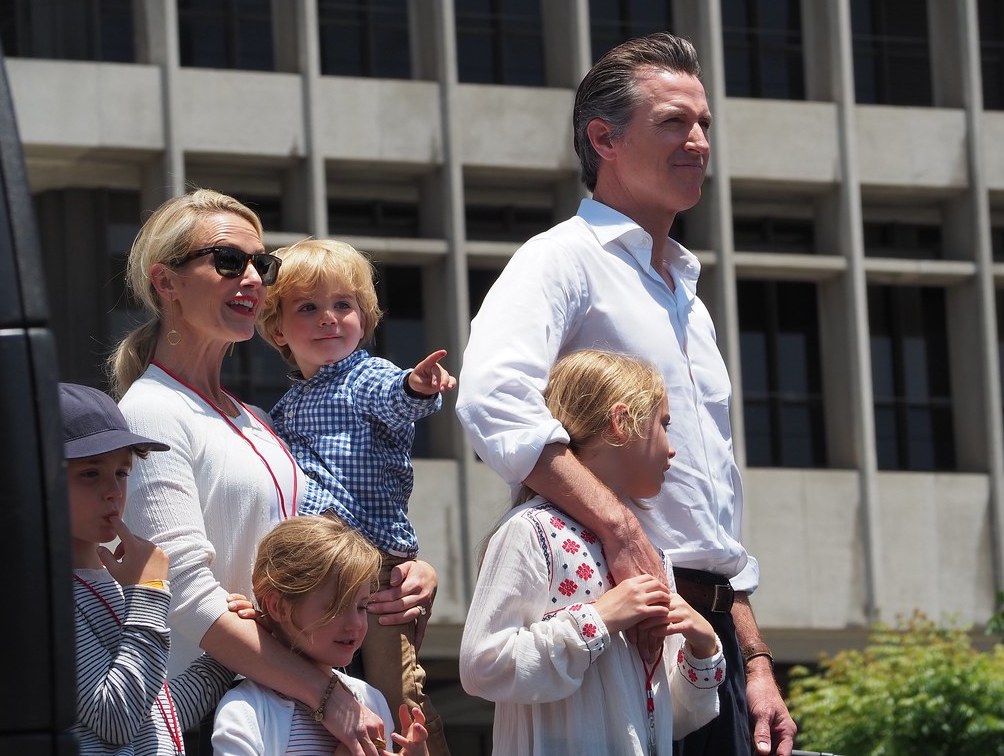After the groundbreaking and historic investments made in early childhood last year, early childhood advocates and families across the Golden State eagerly awaited the unveiling of California Governor Gavin Newsom’s 2020-2021 proposed fiscal budget at the beginning of January.
The proposed budget continues to focus on early childhood development and reaffirms the more than $2.7 billion in First 5 LA-aligned commitments made last year. In addition, the budget puts considerable political capital into multi-year implementation and the long-term planning necessary to make those investments successful. New fiscal investments in early childhood development priorities were modest with approximately $127 million in proposed spending for 2020-2021, increasing to more than $222 million in future budget years. In lieu of more expansive investments in early childhood development services, the Governor’s proposal focuses largely on long-term planning and systems-building.
We’ve broken down the proposed budget into three categories: planning, implementation and governance, as well as a section on new First 5 LA-aligned investments, to help readers understand how the 2020-2021 proposed budget connects with the future picture of early childhood in California.
Planning
The Governor’s summary of his proposed budget continues to emphasize the need for a Master Plan for Early Childhood Development, currently being developed with funding approved by the legislature in the 2019-2020 fiscal year. The Master Plan will be completed by October 2020 with advice from the Early Childhood Policy Council (ECPC), an advisory body appointed by the Governor and Legislature and administered with funding approved in 2019-2020. Members of the ECPC include representatives from First 5 LA (Vice President of Policy and Strategy Kim Pattillo Brownson) and other First 5 LA partners including First 5 California, First 5 Sacramento, First 5 San Joaquin, The Children’s Partnership, Child Care Resource Center, Crystal Stairs/Community Voices, Advancement Project and Los Angeles Unified School District.
The proposed budget also highlights important planning work that will impact Medi-Cal, the state’s Medicaid program, which provides subsidized health coverage for half of California’s children and is a critical funding source for child development services including early identification and intervention. The proposed funding to support the Medi-Cal Healthier California for All initiative – formerly known as California Advancing and Innovating Medi-Cal (CalAIM) – will both accelerate spending on innovative health care management ($695 million in FY 20-21) and behavioral health quality programs ($45.1 million in FY 20-21), and reform state operations ($40 million in FY 20-21) to further transform the Medi-Cal funded health care delivery system.
While the Medi-Cal budget proposals do not explicitly call-out funding for early childhood development services, the budget summary does highlight that the initiative’s planning work will provide the opportunity to connect early childhood health and family support priorities including developmental screening and home visiting. First 5 LA is already informing this work in partnership with the network of First 5s, child health funders, and coalitions of child health advocates, and we look forward to accelerating our focus on Medi-Cal advocacy throughout 2020.
Implementation
The proposed budget highlighted the continued implementation of funding approved in the final 2019-2020 state budget including professional and facility development for early education, home visiting programs, incentive payments to support developmental screening, the expanded Earned Income Tax Credit, and census outreach activities. Though highlighted in the governor’s budget summary as ongoing priority programs, no new funding was proposed for these activities.
In addition, the budget proposal reaffirms the governor’s commitment to expanding California’s Paid Family Leave (PFL) program from six to eight weeks by July 2020, a proposal adopted in the 2019-2020 budget plan. To support implementation, the budget proposes legislative changes to further expand paid leave protections to employees of small businesses so more workers can benefit from the program.
Governance
While the planning and implementation focus of the budget relies on funding allocated in the 2019-2020 budget, the governor is proposing to improve child development program governance by allocating $8.5 million to support the creation of a new Department of Early Childhood Development within the California Health and Human Services Agency (CHHS), effective July 1, 2021. The goal of the new department is to promote a high-quality, affordable and unified early childhood system by focusing on program integration and coordination, starting with early care and education programs.
If approved by the legislature, the new department will administer the various state-subsidized child care programs (CalWORKs, alternative payment, general child care) currently being administered by the Departments of Social Services and Education, federally funded programs (Head Start and Early Head Start), and child care quality programs. The department will also promote better coordination with comprehensive child development services, many of which are administered by other departments within CHHS. First 5 LA’s Long-term systems outcomes include a focus on alignment, quality and accessibility, and we look forward to ensuring that any proposed governance reforms facilitate a more accessible, aligned and quality system for families in L.A. County.
New Investments Aligned with First 5 LA’s Results for Children and Families
In addition to focusing on planning, implementation, and governance, the proposed budget includes the following new investments aligned with First 5 LA’s Results for Children and Families:
Children have high-quality early care and education experiences before kindergarten
- $31.9 million ($127 million ongoing) to provide an additional 10,000 full-day, full school year spaces in the California State Preschool Program (CSPP), which serves three- and four-year-old children. The funds are intended to only support non-local education agency (school district) programs.

- $10.3 million in one-time Proposition 64 (cannabis) funding to support an additional 621 general child care spaces in addition to the $130 million in ongoing cannabis funding to support general child care and alternative payment child care program spaces initially approved in the 2019-2020 budget. First 5 LA strongly supports the continued direction of new revenue sources like cannabis taxes to support access to early childhood programs.
- $75 million to expand the Inclusive Early Education Expansion Program to fund school districts to construct or modify preschool facilities serving students with special needs.
- In addition, the budget proposes using a portion of the remaining $300 million available in the full-day kindergarten classroom expansion fund approved in 2019-2020 for early care and education facilities, and proposes to allow revenues from the school facilities bond, if approved by voters in March, for early care and education facilities as well.
- While not targeted to early education, the budget proposes $900 million to support the education workforce, likely focused on K-12 education settings. If approved in the final budget, First 5 LA will work to ensure a portion of these funds will be available to support early educator workforce development.
Children receive early developmental supports and services, and are safe from abuse, neglect, and other trauma
- $10 million to support implementation of Adverse Childhood Experiences (ACEs) screenings, including $8 million to support a statewide media campaign to increase awareness of ACEs, and $2 million to develop a cross-sector ACEs training program to be certified by the Office of the Surgeon General.
- Creation of a Behavioral Health Task Force, bringing together relevant stakeholders to improve access to higher quality behavioral health services. Aligned with the Medi-Cal Healthier California for All initiative, the task force is not early childhood-specific but provides First 5 LA and advocate partners the opportunity to elevate the importance of early childhood development as a critical component of an integrated behavioral health system.
Families optimize their child’s development
- $73.6 million in FY 20-21 to increase the maximum California Work Opportunity and Responsibility for Kids (CalWORKs) cash grants by 3.1 percent starting October 1, 2020, increasing to $98.1 million in 2021-2022. CalWORKs cash grants are a powerful and direct tool for reducing childhood poverty, and First 5 LA was an early supporter of the state’s efforts to increase the level of CalWORKs cash assistance families receive.
- $57.5 million to support improvements to state and local child support payment systems, streamlining and automating processes that will enable families to receive increased and more timely child support payments.
Proposals aligned with First 5 LA’s long-term systems outcomes, L.A. County regional priorities, and Best Start community change agendas
- $65 million in new, ongoing funding for an immigration rapid response fund at the Department of Social Services to support community-based and non-profit organizations addressing emergency immigration needs in California. The budget also proposes $15 million to create the California Newcomer Education and Well-Being Project (CalNEW) to assist school districts in improving outcomes for refugee and unaccompanied undocumented minor students. First 5 LA opposed the recently adopted federal public charge rule changes which negatively impact immigrant families, and supports the local, state and federal Protecting Immigrant Families campaigns working to protect immigrant family rights.

- $60 million in increased funding for school nutrition, $10 million to provide training for school food service workers to promote healthier and more nutritious meals, and $11.5 million to establish a Farm to School Program to expand healthy food access in schools. While these funds are not targeted toward early childhood settings, school districts are one of the largest providers of early childhood development programs and provide critical food access to families throughout LA County. In addition, the budget proposes $20 million in one-time funding for existing Emergency Food Assistance Program providers to support increased food purchases to address the potential impacts of proposed federal rule changes to CalFresh, the state’s Supplemental Nutrition Assistance Program (SNAP). First 5 LA continues to oppose the proposed federal rule changes to SNAP which would reduce food security for families in L.A. County and require additional state resources to protect food access.
- $750 million to combat homelessness and promote affordable housing development by establishing the California Access to Housing and Services Fund. Homelessness and housing affordability continue to be a priority issue for communities throughout L.A. County. Additional state resources will help ensure L.A. County and city leaders have the resources necessary to promote housing stability, especially for homeless or housing-insecure families.
- The budget proposes a new nicotine content-based tax on electronic cigarettes which is expected to yield $32 million annually and will fund tax administration and enforcement, youth prevention and health care workforce programs. This proposal is related to an Executive Order issued by the governor in 2019 addressing concerns about the increased use of “vaping” products, especially among California’s youth. First 5 LA continues to work with First 5 California and the statewide First 5 Association to highlight pregnant and parenting teens as a particularly vulnerable population in the vaping epidemic. In addition to the public health concerns of e-cigarettes, because First 5 LA is funded by tobacco taxes, any changes to tobacco-related product taxation including vaping products can impact First 5 LA revenues. As with all changes to taxes on tobacco-related products, First 5 LA will continue to prioritize working with First 5 California and the statewide First 5 Association to, at a minimum, reduce any negative impact new tobacco-related product taxes will have on Proposition 10 funds.
State Budget Development Process
The Governor’s budget is the first step in the state budget development process. The state Legislature is currently vetting Newsom’s proposed spending plan and working with stakeholders to develop additional spending priorities for the 2019-2020 fiscal year. In May, the governor will release a revised budget proposal based on updated revenue and policy forecasts, and the Legislature will finalize their recommended spending plans. The Legislature must submit final budget legislation to the governor by June 15, and the Governor must sign the Budget Act into law by June 30. The state fiscal year, like First 5 LA’s, begins July 1.
First 5 LA’s Public Policy and Government Affairs Department will work with our state advocates in Sacramento (California Strategies), our statewide network of First 5s, grantees, and other advocacy partners to influence the final budget to best reflect the priorities and the needs of children and families in Los Angeles County.









